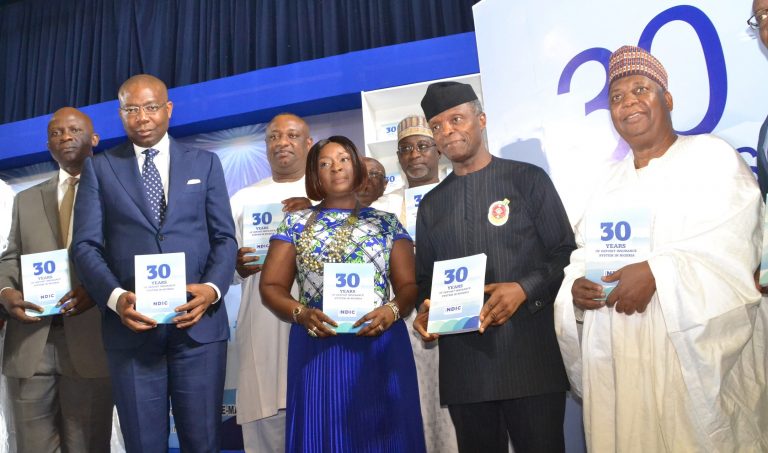Vice President Yemi Osinbajo, on Monday, warned that the time when regulators in Nigeria’s financial services industry are reactionary, waiting for events to occur before embarking on damage control may have gone.
Some of the tools employed to deal with certain situations, including the financial crises of the recent past, such as the Asset Management Corporation of Nigeria (AMCON) type bailout may no longer be possible, considering the huge amount that will be involved.
Prof. Osinbajo, who spoke at the 30th anniversary lecture and book launch of the Nigeria Deposit Insurance Corporation (NDIC), in Abuja on Monday, challenged regulators to invest more time and resources researching into “the nature, management of new risks such as the speed of transactions, cross border transactions, money laundering concerns and data privacy and security issues.”
It is crucial, he continued, that regulators in the financial sector spend more on training their staff to meet the required compliance capacity, noting the challenge with the Federal Government’s determination to include more Nigerians in the financial system over the past four years with the launch of its Social Investment Programme.
He noted in particular, the micro-credit programme covering over two million informal traders, and then our Conditional Cash Transfer scheme meant to cover over a million of the poorest in our communities, which has now reached millions of individuals previously outside the banking system.
Financial inclusion, he continued, has such implications as a much more phenomenally larger customer base for the banks, just as it has implications for regulations, noting however that the government’s signing of the African Continental Free Trade Area agreements is bound to offer greater opportunities for Nigerian banks with footprints already firmly all over Africa.
“These opportunities plus technology present their own issues both for the NDIC, domestic deposit insurers in sister African countries and the regional deposit insurance bodies,” he warned.
Financial services regulators like NDIC of the future, he warned also, will require only a lean workforce, expressing worry at the warning by Aigboje Imoukhuede, immediate past chief executive of Access Bank Plc “that the regulatory infrastructure today belongs to yesterday, and we may not be prepared for the future.”
This, he noted, means that “there is a lot of work to be done,” just as he alluded to studies showing “that overly generous financial safety nets or system have generally tended to increase bank risks and systemic fragility.”
Instead, he urged regulators in the financial services sector to rethink “the short and long term implications of the use of these tools and their sustainability in the coming years.
“The other issue is coping with the implications for banking, of the disruptive technologies that are quickly changing the landscape of financial services. It seems to me that FinTechs will continue to be the most profound force for change for both good and ill ever seen in the financial services industry.”
While applauding the NDIC for continually demonstrating that it is an institution deserving of all the past and present accolades and commendations it has received, he urged the board and management to be proactive, especially given the number of institutions presented covered.
Besides the AMCON bailout model, the Vice President identified the challenge of coping with the implications of FINTECHs being disruptive technologies that are quickly changing the landscape of financial services for banking.
Going forward, he noted that rather than continuing to leave in denial, FinTechs would seemingly “continue to be a most profound force for change both for good and ill, ever seen in the financial services industry.”
This, he noted, is why banks all over the world are already “investing in FinTechs and may in time become FINTECHS themselves as these smaller firms are eating faster, with more innovative systems, into the customer base of most of our banks – in mobile payment systems to the various crowdfunding ideas.
From left, Representative of the Speaker, House of Representatives, Victor Nwokolo; guest lecturer, Aigboje Aig-Imoukhuede; Minister of State for Niger Delta Affairs, Festus Keyamo; NDIC Board Chairman, Ronke Sokefun; Minister of Water Resources, Engr. Suleiman Adamu; Vice President, Yemi Osibanjo, and NDIC MD/CE Umaru Ibrahim, at the Nigeria Deposit Insurance Corporation (NDIC) 30th Anniversary Lecture and Presentation of the Book: “30 Years of Deposit Insurance System” in Nigeria on Monday in Abuja.








